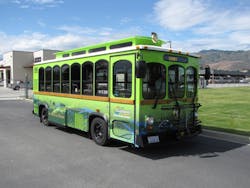Link Transit launched Five Battery-electric Trolleys
After a four-plus year delay in delivery, Link Transit has finally successfully launched “The Current,” a five-vehicle fast-charged battery-electric trolley service in downtown Wenatchee and East Wenatchee. Originally slated for delivery in October 2010, the project has been beleaguered by numerous technical problems relating both to the design and production of the battery components and the chargers.
The project was funded in 2010 by the Federal Transit Administration’s Transit Investment for Greenhouse Gas and Energy Reduction (TIGGER) program, part of the American Recovery and Reinvestment Act (ARRA). Of the more than $2 billion in requests TIGGER received, just $100 million was awarded. Link’s $2.9 million grant funded the purchase of five new electric trolleys, two “ultra-quick” charging stations and one overnight charging station, as well as staff time associated with project management. “It has been a long, drawn-out process”, said Richard DeRock, general manager of Link Transit. “At times we were unsure if the project would be successful, but we are very pleased that the vehicles are finally in operation on a full-time basis, and we were able to minimize the cost of the delays.”
The manufacturer of the trolleys was EBus of Downey, California. The U.S. engineered and constructed trolleys are 22 feet long, with a capacity of 22 seated passengers and 10 standing passengers. Original specifications for the trolleys called for lithium-ion titanate batteries. However, problems with the cooling plates, which were an integral part of this design continued, despite several attempts to redesign and manufacture them. In early 2014, the lithium-ion titanate version was scrapped and replaced with an lithium-titanate iron-phosphate battery, which has proven to be much more reliable and requires less frequent charging while providing a longer range than the other batteries would have. Link has been operating one trolley with the lithium-titanate iron-phosphate batteries since the summer of 2014.
Battery replacement costs per vehicle are projected to be $40,000, but that’s very reasonable considering that, based on current fuel prices, Link would pay about $180,000 per vehicle for diesel fuel in a 10-year period.
The electric trolleys are charged with locally generated hydroelectric power. Hydroelectric power is the primary power source for the entire region; there are four hydroelectric dams located within a 50 mile radius of Wenatchee. Hydropower is economical, clean, renewable, and produces no greenhouse gases in its generation process. Commercial power rates in Wenatchee are the lowest in the nation.
The electric trolleys replace four diesel trolleys that were in operation since 2005, eliminating an estimated 688 metric tons of carbon dioxide and carbon dioxide equivalent emissions on an annual basis. The new trolleys will operate on a 10-mile business district/commuter route that passes through the major business and shopping districts in the Wenatchee Valley. “Over 23,000 passengers per month ride these routes at present,” DeRock stated, “and our hope is that many more people will ride the Current, reducing vehicles on roadways and the accompanying emissions. “
Link Transit began operating in December 1991, and provides service to 18 primarily rural communities in Chelan and Douglas Counties from its base in Wenatchee, Washington. Link will carry about 985,000 fixed route passengers in 2014.
